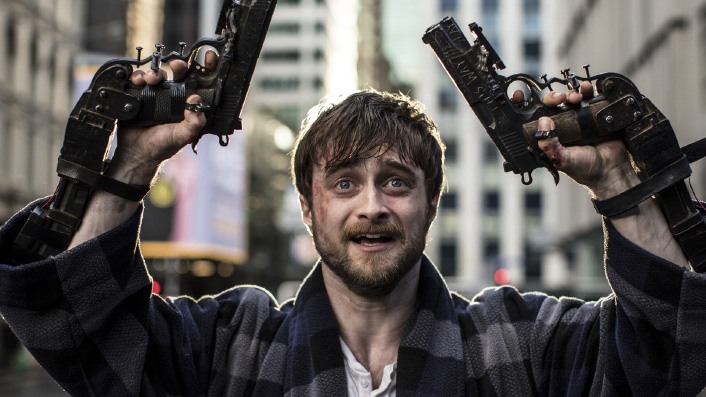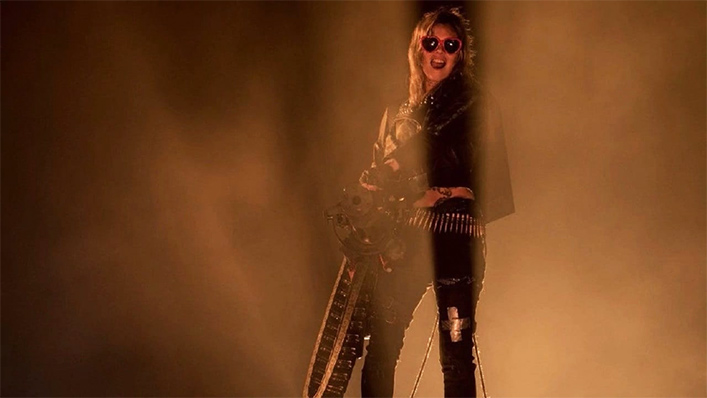Guns Akimbo is a grungy exploitation movie desperate to look cool and edgy

Daniel Radcliffe wakes up with guns bolted to his hands in the dystopian action-comedy Guns Akimbo. It’s frenetic but also painfully contrived – with a premise better suited to a video game, writes critic Luke Buckmaster.
Daniel Radcliffe was only 11-years-old when he first started running into brick walls at train stations, his tenure as the wand-waving wizard at Hogwarts spanning the London-born actor’s entire adolescence. After starring in eight Harry Potter blockbusters made over the course of 10 years, Radcliffe was finally freed from the ghastly halitosis of Voldemort, and the clutches of superfans so obsessed they store the ashes of their dead mothers in Potter-themed jars.
His real-life coming-of-age had ended, but his cinematic coming-of-age only just begun. The equivalent of a teenage rebellion period saw the actor drink the proverbial bong water and embrace edgier roles. Thus a cocaine smuggler here, a farting corpse there, and now – naturally – a man in the action-comedy Guns Akimbo who has guns bolted onto each of his hands. Which is what would happen in real-life if a manicurist and a gunsmith teamed up to offer clients “the David Cronenberg.”
Like in Death Race 2050, a superior midnight movie similarly whipped together with a pumping pace and digi-junkyard aesthetic, Guns Akimbo is set in a scuzzy dystopian world where revheads, tech heads and punks have metastasized into a hideous cross-breed of humans, or human-ish things. They are addicted to a grotesque live-streamed spectacle called SKIZM: essentially a televised deathmatch run by a bald and heavily tattooed gangster called Riktor (Ned Dennehy), whose name reflects his dramatic presence – in that he has all the menace of a bathtub toy.
This agitating cartoon villain, perhaps a relative of Dennis Hopper’s bald patch-wearing scoundrel from Waterworld, thrusts video game developer Miles (Radcliffe) into a ‘kill or be killed’ conundrum after he notices the protagonist’s habit of trolling online trolls (the message: don’t feed the trolls, folks!). Miles is pitted against the tournament’s star player, the relentless Nix (Samara Weaving), whose badassery is reiterated every time she opens her profanity-spewing mouth – delivering lines that weren’t, shall we say, inspired by Gone with the Wind, such as “suck my clit, nobody is killing fuck boy over here.”
Nix hollers that urbane turn-of-phrase while standing on a car and straddling a gatling gun, wearing heart-shaped sunglasses and a belt made of bullets – because random. Her constant, witless hissing and jiving establishes her character as the film’s second cut-rate villain as well as an unashamedly puerile presence. It also crystallizes a desire obviously at the heart of Jason Lei Howden’s writing and direction: a desperation to come across as youthful and irreverent. I am not familiar with this man(child)’s oeuvre, but was not surprised to discover his 2015 feature film debut is titled Deathgasm.
Fair enough, you might say: the attraction of an grindhouse style assault to the senses, like Guns Akimbo, is to have fun – not reflect on the vagaries of the human condition. How, then, might one defend the protagonist’s inexcusably pedestrian voice-over narration, which is a different kind of trashiness: the very safe and very boring kind, lazily breaking the ‘show don’t tell’ dictum. The kind that interrupts a dramatic moment by explaining to the audience that (direct quote) “suddenly I knew what to do. How I could end this once and for all.” Groan.
The Deathgasm maestro has not just made a really dumb movie, but a really dumb movie that’s also very smug: a noxious combination of imbecilic and self-satisfied. When the comedy is not lewd, it’s laboured. In one moment, for instance, a professional killer comments that he doesn’t like watching The Walking Dead because it’s too violent – and, oh, the irony!

The narration fares slightly better when Miles, after killing a baddie, says to himself: “No respawns. No one-ups. No extra lives. I just killed this fucking guy.” Not because it’s a good line – it most certainly is not – but because it suggests something also hinted at through the protagonist’s profession: that the film’s concept is probably better suited to a video game.
At times Guns Akimbo‘s sheer energy is almost enough to get it over the line, comprising a high-powered aesthetic sprayed with contemporary flourishes – from emoji-decorated frames to AR-like visualisations resembling Snapchat animations. But the director’s desperation to impress infects virtually all aspects of the experience, with the exception of the aforementioned voice-over (which feels like it was tacked on at the last minute) and Radcliffe’s performance. Impressively, the actor, as he continues to approach cinematic adulthood, manages to look effortless while at the centre of a painfully contrived film.

















